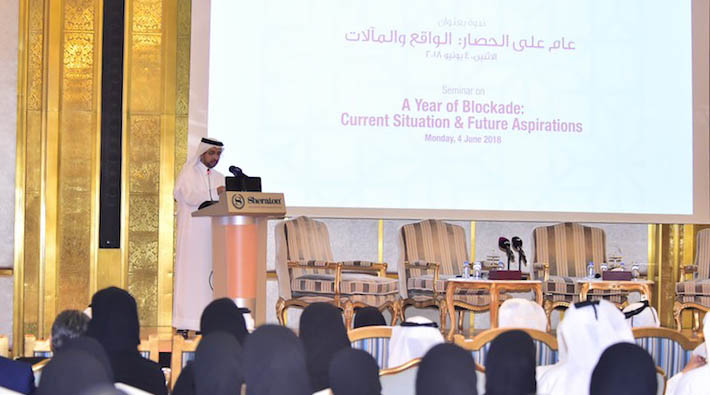Qatar University (QU) recently hosted a seminar on the ongoing blockade against Qatar to discuss the consequences of the crisis at the local, regional and international levels. HE Sheikh Thani bin Hamad Al Thani was the guest of honour at the seminar, held at the Sheraton Grand Doha Resort and Convention Hotel.
Titled, ‘A Year of Blockade: Current Situation and Future Aspirations’, the seminar gave an academic perspective on the effect of the blockade on Qatar and the region in terms of international relations and law. HE Sheikh Thani bin Hamad Al Thani was joined by QU President Dr Hassan Al Derham and other officials from QU.
In his remarks, Dr Hassan Al Derham said that Qatar has achieved in one year what other countries could take several years to accomplish. He mentioned that as a nation, Qatar has overcome all constraints and in the process, earned the respect of the world. As per international indicators, Qatar’s economy is stable, and its big projects such as the FIFA 2022 World Cup projects, the Rail and the infrastructure development projects, are still ongoing and have not been affected by the blockade.
We do not fear the boycott of these countries against us, we are a thousand times better off without them. But vigilance is required.’
One of the speakers, Lulwah Al Khater from the Foreign Ministry, noted that the blockading countries were also surprised by Qatar’s steadfastness and success in overcoming the effects of the blockade.
The siege countries are reviving a distorted form of Arab nationalism by breaking two of its values – the socialist dimension and the Palestinian issue – as these countries have recently shown a negative position about the Palestinian issue.’
Another speaker, Dr Majed Mohammed Al Ansari, also from QU, said that the crisis is not temporary and is in fact, deep. He said that the blockade will re-asses the way society adapts and deals with principles and the external environment. In this context, he said that QU and many of the local institutions made huge interactions about the crisis since the first day.
He said that the crisis underscored the vital role of Qatar University as a ‘house of expertise’. They already launched numerous programmes and research projects about the blockade and the crisis.
Dr Nayef Bin Nahar, another speaker from Qatar University, highlighted the challenges that Qatar should tackle despite its success through the crisis. He said that Qatar must seek to maintain its presence and achieve a balance of power.
Dr Nahar also stressed the importance of developing alliances, highlighting the Qatari-Turkish model. He noted that it’s important to develop relations with other allies in the region, like Iran and Russia, for the strategic interests that these countries share with Qatar.
The Gulf Cooperation Council is only necessary as a service institution that maintains the permanence of intra-regional transportation and trade. As a political system, the Council cannot remain the way it is. It is in the interest of Qatar to add new members to the council.’
For more information and updates on this issue, check out this link.








